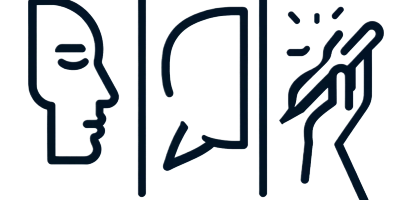Three Ownerships

Establishing self-sovereignty as a thought-leading individual is essential if you want to say what you mean and make anything meaningful happen because of it. You need to maintain integrity between your intentions and their implications. What you say as a thought leader helps make that integrity happen. In today's content climate, your integrity and impact depend on owning three things. Organizations need to understand this dynamic as well.
The Three Ownerships of Thought Leadership
Your thought leadership creates the space where you can own three things: your face, your voice, and your hand.

Face: How you show up in the world. Owning your face means managing the demeanor you choose to present, the persona you adopt, and the energy you transmit. Thought leadership can be the professional face you choose to show in your work.
Voice: What you say. Owning your voice means choosing the ideas you stand for and the clarity with which you do so—in both substance and style. As a thought leader, part of your work is perfecting the craft of thought leadership and the way you deliver thought-leading messages.
Hand: How you apply your strength. Owning your hand means controlling what you do with your time and effort to accomplish work and attain the results you choose to commit to achieve. Following the harder, steeper path of making change happen in an industry via thought leadership is a powerful choice of this type.
The metaphors of face, voice, and hand apply to groups and organizations, too. Imagine the collective energy of many faces, voices, and hands working together within a thought-leading organization. That energy starts with ownership.
A Definition and a Bit of Theory
Let's define ownership of something as the right to control its use and derive its income and benefits as you see fit. Ownership has philosophical and ethical dimensions.
In the work of the German philosopher Hegel, ownership is interwoven with freedom. It allows individuals to externalize their will into the world, making their inner will visible and tangible. It entails personal identity and moral agency because people can realize their potential and achieve self-consciousness through ownership. That description echoes the concept of being a thought leader and driving business results forward with an intentional approach to ideas-led growth.
A century later, Heidegger shifts the definition of ownership to an existential concern. "Ownness" or "authenticity" means being true to one's own existence rather than possession, making genuine choices that reflect one's own desires and values rather than conforming to externally imposed expectations. Although it is a more inward-looking view than Hegel's, it resonates with the inner drive that I hear many thought leaders express when they explain their choices to commit to the practice of thought leadership.
Ownership does not, however, grant complete immunity to other obligations. It entails ethical responsibilities that must respect societal norms and ethical considerations (such as the duty to use property in ways that do not harm others or a community. We are best served by being mindful of what we say and the implications of the changes we advocate for.
Can You Be Employed and Own Your Work?
In employment relationships, the lines get blurry between ownership by legitimate title and the right to enjoy the fruits. "Usufruct," in legal terms, grants the right to use and benefit from someone else's property without owning it.
When you innovate as an employee, your employer usually owns the intellectual property IP (obviously, this does not constitute legal advice). However, you still benefit from it in terms of your reputation and career. Moreover, in many cases, your innovation is driven by the personal challenge of innovation as much, if not more, than by an organization's strategic imperatives. There are levels of ownership and usufruct that transcend physical properties to intellectual and creative realms.
It's simple. You care. You feel satisfaction. You continue to grow.
Compounded Ownership
In turn, organizations that cultivate thought-leading individuals by nurturing and investing in thought leadership grow as well. People with a sense of ownership welling up from within their own authenticity will be better, stronger contributors. When they lend their faces, voices, and hands to broader objectives, they move organizations forward by driving innovation, creating relationships, and building trust.
However, the professional and cultural incentives for thought leadership must be in place for that dynamic to take hold. Conversely, misplaced efforts to institutionalize thought leadership will erode ownership and stifle the growth that thought leaders can deliver—case in point: broken or overweight marketing processes.
Why Content Mentality Is Anti-Ownership
Three factors will diminish your ownership of your face, voice, and hand—to the point of nothingness if you allow it to happen:
- Over-adaptation to norms that are not your own
- Over-assimilation of manufactured desires
- Over-reliance on validation from others
All three diminishments occur when you apply conventional content marketing logic to your work as a thought leader. Eventually, the norms and incentives of content culture corrode your autonomy. They eat away at your values one compromise at a time. You optimize your content at the expense of your ideas a few times or embrace an ethically untenable platform to get the views...but what's the difference between collaboration and complicity?
If you're a thought leader, what's the point of getting more people to see something that doesn't properly represent your thinking or that leads people slightly off-course? You'll never free yourself from mediocrity by using the tools of the mediocre content crowd.
And yes, by definition, those tips and tricks for mass reach are the tools of mediocrity.
Reappropriating Your Thinking
Let's leave it with a few questions about you and your connection to your own thought leadership:
- Do you own what you see in the mirror?
- Do you own what you tell people?
- Do you own what you do and why?
Exploring these questions with the same rigor and honesty you use in your professional thought leadership can help you identify your personal standards of ownership. At the same time, if you work within a larger organization, the answers point to non-negotiable terms. Insist on them as your thought leadership is chopped up and processed for mass consumption by the content industrial machine.
Three Grace Notes
“Since the owner of such a product, in owning a copy of it, is in possession of the entire use and value of that copy qua a single thing, he has complete and free ownership of that copy qua a single thing, even if the author of the book or the
inventor of the machine remains the owner of the universal ways and means of multiplying such books and machines, etc. Qua universal ways and means of expression, he has not necessarily alienated them, but may reserve them to himself as means of expression which belong to him.” Georg Friedrich Wilhelm Hegel, The Philosophy of Right
"In the midst of beings as a whole an open place occurs. There is a clearing. Thought of in reference to beings, this clearing is more in being than are beings. This open center is therefore not surrounded by beings; rather, the clearing center itself encircles all that is, as does the nothing, which we scarcely know. Beings can be as beings only if they stand within and stand out within what is cleared in this clearing." — Martin Heidegger, "The Origin of the Work of Art," Basic Writings
"Freedom means self-sovereignty. Usually we do not choose to live our lives. We allow our thinking and our feelings to drag us around in different directions. In this way we become nothing but the victim of our thoughts, our feelings, and our fear. A hoisted flag flaps in the wind; it is the victim of the wind. A cork thrown into the sea floats up and down on the waves; it is the victim of the waves. In your daily life you are the victim of the waves of feelings, thoughts, and mental formations."— Thich Nhat Hanh, Cracking the Walnut
Note: The links above are affiliate links. I'm using them in lieu of paid subscription tiers or digital tip jars. Seems like a much more graceful way to generate financial support while sharing more thinking and writing that can guide thought leadership.
One More Thing
"My Computer," Cadence Weapon
"My Computer" is from Rollercoaster, the new album by Canadian rapper Cadence Weapon. It explores the many ways that the internet has gone from "utopian playground to capitalist junkyard." Sonically and lyrically, it paints an incisive picture of the attention economy. It's both brilliant and fun to listen to.
Album
